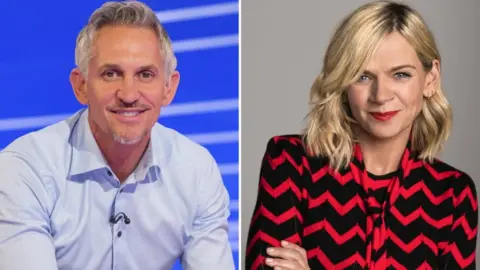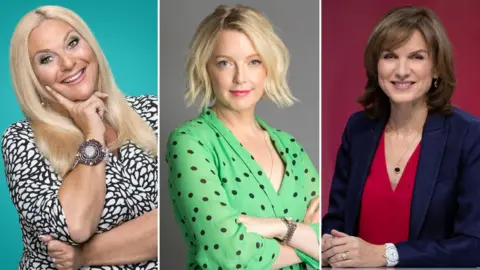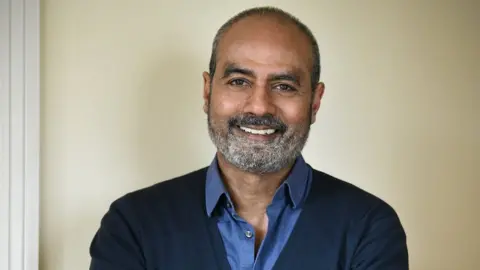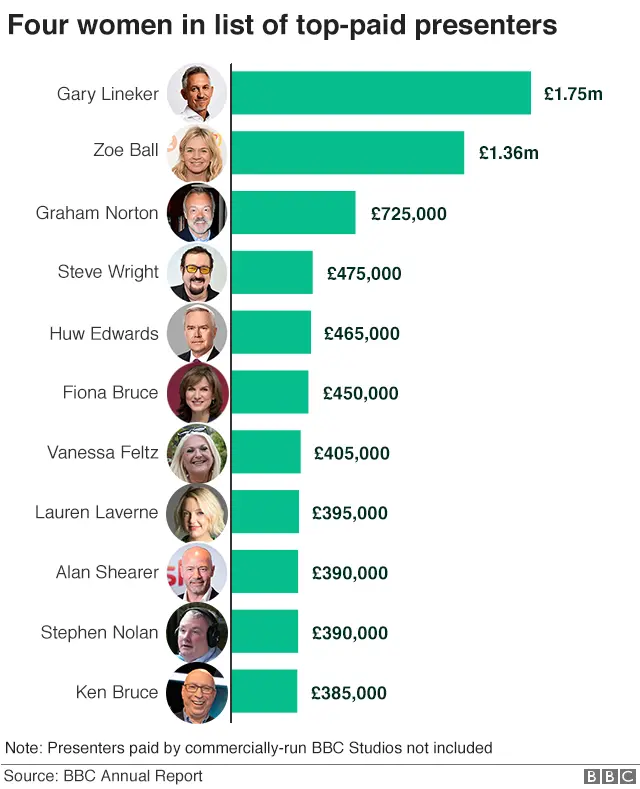BBC star salaries: Gary Lineker takes pay cut as Zoe Ball shoots up list
 BBC
BBCMatch of the Day host Gary Lineker has agreed a £400,000 pay cut, the BBC has revealed as it publishes the latest list of its best-paid presenters.
Lineker was the highest-earning star with an unchanged salary of £1.75m in the 2019/20 financial year.
But he has since signed a new contract, which will see that fee cut by 23%.
That means he could earn less than Zoe Ball next year. The Radio 2 presenter has seen her pay rise by £1m since taking over the breakfast show in 2019.
Fiona Bruce and Lauren Laverne have also moved into the top 10 of the highest-paid stars, which features four women for the first time. Vanessa Feltz is also among the top earners, the corporation's annual report shows.
However, many stars do not appear on the list because the corporation's commercial arm, BBC Studios, does not have to publish its talent spend.

All 10 of the top-earning presenters on this year's list are white, although the BBC's director general Tim Davie said 18% of those making more than £150,000 were from black, Asian and minority ethnic (BAME) backgrounds, up from 12% four years ago.
"We made good progress, if you look across the industry we're in a good place, but we've got work to do," Mr Davie said.
And while 26.5% of actors and presenters were from BAME backgrounds, it was a different story behind the camera, with 9.8% of production staff from ethnic minorities.
The report also showed 12.3% of BBC leaders were BAME, below its 15% target for 2020.

Lineker's new salary will be published on next year's list. Director general Tim Davie described the former England player as a brilliant broadcaster and said his new five-year deal was a great example of the "best talent and the best value".
"And before you ask, Gary knows his responsibility to the BBC in terms of his use of social media," Mr Davie added, referring to social media rules for BBC staff and presenters that are expected to be announced soon.
Lineker, a prolific tweeter who frequently discusses his political views online, said the BBC "recognise that I tweet carefully and will continue to do so", and sent a message to "the haters" on Twitter.
Allow X content?
The stars of some of the BBC's biggest programmes - like Top Gear and Doctor Who - are absent from the list because they are made by BBC Studios.
Ball's Strictly Come Dancing spin-off It Takes Two is produced by the commercial arm, and so is not included. But her pay has risen because this is her first full year since taking over from Chris Evans on Radio 2.

Last year, the top earners included three women - Ball, Feltz and Claudia Winkleman.
Overall, the BBC's total salary bill for on-air talent in 2019/20 rose by £1m to £144.6m, while salaries for the BBC's executive committee rose from £4.95m to £5.41m.
Conservative MP Julian Knight, who chairs the Department for Digital, Culture, Media and Sport select committee, said the overall rise in pay for on-air talent was "concerning".
He said: "Despite Gary Lineker's pay cut, when millions of pensioners are having to find extra cash to pay for the BBC and services they depend on, it's concerning to see not only has the bill for on-air talent has grown by more than £1m but that more than 100 senior executives are paid over £150,000 a year - in many cases considerably more than that."
The overall gender pay gap at the BBC has fallen from 6.7% to 6.2%. Previous director general Tony Hall had pledged to close the gender pay gap by 2020.
Mr Davie said that "was a very aggressive target," adding: "We can be proud of our progress but we must go further."
He said he wanted to increase the number of women across leadership ranks, where the figure currently stands at 45%, short of the 50% target. "It's about the leaders, not talk but action," he said.
There are "a small number of historic equal pay cases" to be resolved, the report said.


This annual report contains plenty of complex messages, but is likely still to lead to simple and negative headlines for the BBC.
The list of salaries for on-air broadcasters - which includes me - reflects three years of reforms.
As part of those reforms, many broadcasters - particularly but not exclusively men - either took significant pay cuts (Huw Edwards, Jeremy Vine etc) or left the BBC (Chris Evans, John Humphrys leaving Today, Eddie Mair).
Now, several broadcasters - particularly but not exclusively women - have had pay rises.
Crucially, the pay rises for these female broadcasters (Zoe Ball, Fiona Bruce, Lauren Laverne, Emily Maitlis), reflect additional work.
The overall rise in pay for those whose salaries are published - around £1m - is not, in financial terms, huge, given the number of people to which it pertains, and the salaries themselves. Indeed, it is below inflation, and therefore a cut in real terms.
Nevertheless, the optics are bad for the BBC. Complexity doesn't cut through in stories about high pay.
The simple fact is, in a time of immense hardship across the country, with so many people redundant or furloughed and suffering, these huge salaries (and their modest overall increase) will strike many licence fee payers as disgraceful.
The other big story is the BBC's finances. In the medium-term, they are badly strained. It is striking that by the end of next year, the BBC will have delivered around £800m in savings in just five years.
But the fact that the licence fee didn't rise with inflation between 2010 and 2017, and the £125m hit (at least) from the coronavirus pandemic, are a huge injury to the bottom line for the coming year.
And that's before you even consider whether a generation who give so much time to TikTok, YouTube and WhatsApp feel they need to pay for a TV licence.


What else did the BBC annual report say?
Licence fee income dropped by £170m to £3.52bn in 2019/20, partly due to evasion. Overall, the BBC's overall income was down by £119m.
There was growth in commercial income from BBC Studios, and the corporation's chairman Sir David Clementi said a drive to increase such revenue would be "even more pressing" because there will be "major financial pressures on the BBC" in the coming years.
The coronavirus pandemic means the organisation has faced "significant challenges" and will have to find extra savings on top of those already planned.
The BBC has already saved £618m since 2016/17, and that figure is expected to rise above £800m by the end of the current financial year, the report said.
